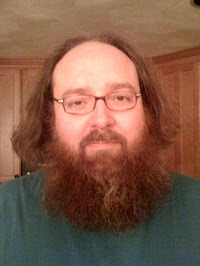
Questions for Rusty Barnes
***Interviewed by Sue Miller
Rusty Barnes grew up in Appalachia and made his home in the Boston area. He's the author of Breaking It Down, a book of flash fiction (Sunnyoutside Press), and Redneck Poems, a chapbook (MiPOesias). Published widely in both print and oon the web, Rusty's shopping his first novel. He is perhaps best known as the co-founder of Night Train, but he is taking a bigger slice of literary pie these days, with both Fried Chicken and Coffee, a blog focusing on the voices of rural America and the issues that threaten it, and Live Nude Poems, which presents—with commentary--the work of poets that must be read. We had a few questions for Rusty, in advance of his appearance at the upcoming Somerville Writer's Festival on November 13.
What did you want to be when you grew up?
At various points, a preacher, an FBI agent, pro baseball player.
What was the first thing you remember writing?
Other than school assignments and a couple of 'poems,' I don't really recall. It's come to me so easily I felt (and sometimes still feel) as if I was born doing it. I listened a lot as a child, mostly to my family's stories. My extended family used to get together at someone's house, usually my grandmother's trailer on Sundays, brew some coffee, then sit and talk for six or seven hours. No joke. This happened throughout my childhood and up until my grandmother died in 1981. Then it more or less stopped, though on a good day you can still get them (my dad's family) going. This is where I learned to listen for the stories. Writing them down came later.
Who told you were good, and when?
I was encouraged all along by my parents. Our landlord, Edmund Tuton, this mysterious and wonderful man who came from exotic Long Island, often gave me money and books for getting good grades. He told me I was good. I found out how dumb I was in grad school—very—yet I got key encouragement from my teachers Christopher Tilghman and DeWitt Henry when I was ready to quit and go home.
How much time do you spend writing, in a week?
I actually think it's more important to read. My reading time counts 4 or 5 to 1 against writing. I read from midnight to 3 am nearly every day, usually a book of fiction, one of poetry, and one non-fic/memoir/biography at the same time. We have a two-year-old who has had sleeping issues, too, so that time is often spent singing silly songs very quietly or telling stories or walking around with her on my shoulder.
What is most satisfying to you as your fingers hit the keys?
I love building characters and putting them through hell in fiction. I love getting an image or feeling or seeing something strange, and nursing it into a poem. I enjoy the workmanlike feeling I get from non-fiction, of making myself clear when my nature is to speak quickly and get as much out as possible before something shuts my mouth.
I think I'm a poet first, even though my first three published books are (or will be) fiction.
What would you be doing if you weren't a writer?
There are many things I'm competent or even semi-good at, but none of them ever really appealed as a career. Once I made the decision to be a writer, that's what I was, though I worked as a house cleaner, janitor, teacher, editor, tutor in the many interims. I write because I'm not really good enough at anything else.
Which is stronger: the urge to create or the need to destroy?
I constantly struggle against my better self. I am so good at destroying and otherwise fouling up my emotional and inner life, turning it all haywire, so good, but I have to feel like a creator to feel right operating in the world.
Rusty Barnes will be reading November 13, 2010 at the Somerville Writer's Festival VIII, hosted by Timothy Gager at the Center for Arts at the Armory. Advance tickets are available through Brown Paper Tickets (617-718-2191). There will be a daytime book fair with readings beginning at 7 p.m. Features: Malachy McCourt, Sam Cornish. Writers and Poets: Jennifer Haigh , Steve Almond, Michelle Hoover, Ethan Gilsdorf,Rusty Barnes, Fred Marchant, Diana Der-Hovanessian, David Ferry, Martha Collins, and Douglas Holder. Sponsored by Porter Square Books and Grub Street



